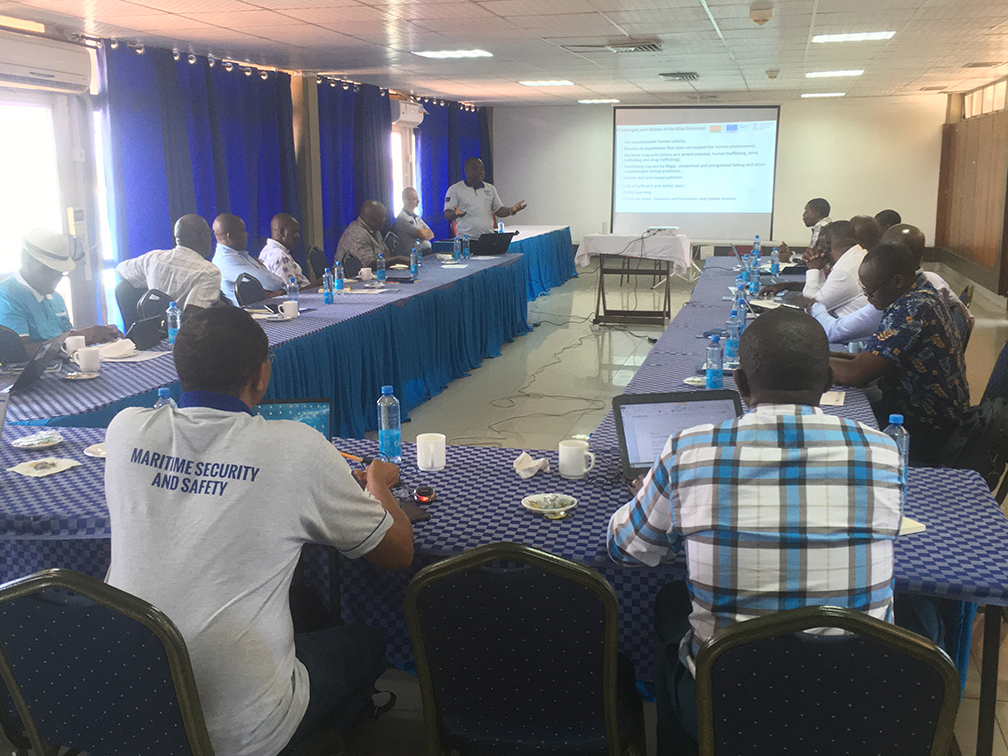
Expertise France, in collaboration with the Bandari Maritime Academy and with financial support from the European Union, organized on 25 January 2023 a first information session on Maritime Domain Awareness and Blue Economy for 13 participants representing different key Kenyan maritime security stakeholders. The ultimate purpose of this activity is to sensitize the participants with the perspective of developing a new series of maritime curriculum dedicated to the Government Agencies in Kenya. All sessions are part of the maritime security component of the Go Blue programme, a joint initiative to advance the Blue Economy agenda across all coastal Counties in Kenya (Mombasa, Kwale, Kilifi, Tana River, Lamu, and Taita–Taveta).
Maritime domain awareness: an enabler of the blue economy
“Maritime domain awareness is basically understanding everything that can be associated with the maritime domain that could impact the economy, the environment or the security and safety of a country,” explains Wenceslas Gbaguidi, a West African expert in maritime governance with Expertise France. “It is fundamental for every country that has access to the sea to know what’s out there, who is doing what, and in case of any offences, what should be done about it.”
Countries have always gathered information about the maritime environment, in order to detect potential threats from different sources such as coastal radars, ships, aircraft and satellites. However, over the past decade, new tools have emerged at a time when various maritime challenges such as piracy, terrorism, human trafficking or illegal fishing, have changed dramatically, making it increasingly challenging to secure the maritime domain.
“Today’s session was very informative, especially around the legal and security aspects of maritime domain awareness,” says Mr. Bakari Wato, superintendent of the National Police Service Border Unit based in Lamu. “Since we border Somalia, we face many legal challenges as some agencies we work with are not fully acquainted with the legal procedures. We need to train and teach our colleagues so we can help address those challenges, such as illegal, unregulated and unreported fishing activities. By having better data, it will help our government to look into a system that will prevent those activities, get a lot of more revenue, and ultimately improve our economy and the living conditions of the people of the coastal regions and Kenya at large.”
With a more globally connected economy and countries relying on the global maritime environment for trade and commerce, a safe and secure maritime environment is critical to national security and economic well-being. The necessary resources and technologies are often out of reach for many countries, leaving much of the oceans as ungoverned spaces for illicit or other bad actors.
Increase capacity-building efforts: support Kenyan trainers to become experts
“Maritime domain awareness is a critical component of the blue economy as it gives an introduction to what the blue economy all has to offer,” says Mr Abdalla Boto, Deputy Director, Maritime Education and Training at the Bandari Maritime Academy. “As we are building our blue economy, all agencies present here today have a role to play so that at the end of the day we can show results as a nation,” he adds on.
While information is a fundamental requirement in the maritime domain, national enforcement agencies will also require further inter-agency coordination to take action against illicit actors. By bringing various key Kenyan maritime security stakeholders together, the aim is to support the Bandari Maritime Academy in becoming a training “centre of excellence”. Over the coming months, Kenyan trainers will be trained not only on maritime domain awareness, but also on other thematic topics such as maritime pollution, Search And Rescue, Illegal, Unregulated and Unreported fishing, and Monitoring, Control and Surveillance.